THE PLOT: 38-year-old American writer of erotic fiction Scott Wardman (Charles Bronson) falls for a swinging 16-year-old London girl (Susan George). Big trub all round!
It was inevitable the ’60s would produce a comedy Lolita. The twin trends of ‘edgy’ age of consent taboo-poking and silly, sped-up, knees-bent-running-about slapstick comedy were bound to end up colliding somewhere over North London before the decade fell over. Well, they weren’t bound to at all really, but they did all the same. It was that kind of decade! And this film marks the spot where the social realism of Karel ‘Morgan!‘ Reisz’s Saturday Night and Sunday Morning met the silent whimsy of Richard ‘Superman III‘ Lester’s A Hard Day’s Night head on.
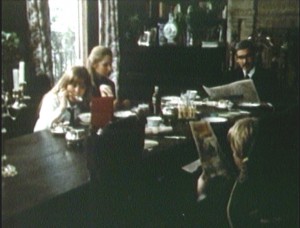 |
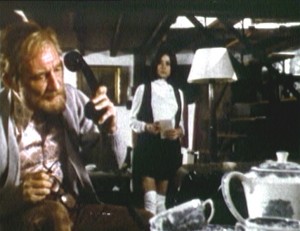 |
Richard ‘Superman II’ Donner directs, following on from overseeing daffy Rat Pack Bond pisstake Salt and Pepper. The script comes from one Norman Thaddeus Vane, fresh from penning last year’s Herman’s Hermits vehicle Mrs Brown You’ve Got a Crunchy Snack There. The sprightly songs spring from the ever-chipper quill of Jim Dale. As a lovely old United Dairies milk float trundles down an overcast Rylance Mews, accompanied by a chirpy, 2000mph trumpet-led swinging theme that wouldn’t be out of place heralding a Bruce Forsyth-helmed variety spectacular, it’s hard not to have the grudging expectation that this could well, in some small way, be any good. Let’s get the Rank Organisation/World Film Services network together!
We cut to a none-more-middle-class Ask the Family-style breakfast table (‘stop doing whatever it is you’re not supposed to be doing!’), as dad Mr Londonderry (Michael Craig) and bespectacled, frustrated mum (Honor Blackman) reprimand daughter Sybil (Susan George) for reading a lewd paperback. ‘Absolutely filthy! Your grandfather will hear of this!’ Gramps turns out to be a routinely eccentric, trigger happy (‘Churchill may have signed a peace treaty but I haven’t!’) generically geriatrically bawdy, and played by Trevor Howard, in the first of many fun to spot but ultimately not really any good character cameos.
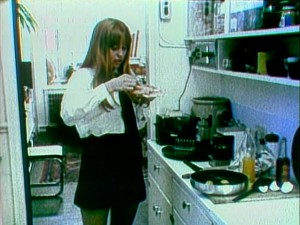 |
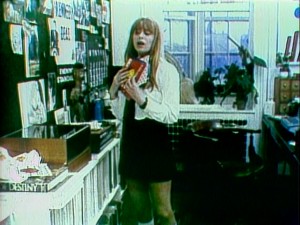 |
This lengthy exposition is jollied up by cutting between the family table and scenes between Bronson and Sybil (or Twinky as he calls her – confusingly he also calls her Lola when he feels like it) in the former’s echoey bachelor pad. (Sound quality in this all-location shoot is diabolical, worse than the Children’s Film Foundation at its most cash-strapped.) Bronson is supposedly 38, but looks a fright, with Planet of the Apes chops and a Leonard Nimoy Number Eight Crop on top of his head – one of those ‘every hair on the scalp precisely one inch long’ jobs, a haircut to identify psychopaths by. He gurgles and wheezes his God-awful lines in a voice halfway between Johnny Cash and Jackie Mason, like he was an especially disaffected tour guide at The American Adventure in the middle of February. In short, he’s not ‘Scott Wardman’, he’s Charles Bronson as bloody ever, and anyone coming to this film with a fine tooth comb in a little tortoiseshell case ready to search this film for evidence of any redeeming features about the man, don’t bother. As ever, there are none.
Countering this, Susan George is terrible in a different way, overdoing the squeaky jolly hockey sticks manner to boiler-busting levels. (‘I’m in a muddle as to whether to tell you something or not!’) It’s intensely irritating, especially in Bronson’s grotty, overlit, echoey kitchenette – a cross between Jenny Agutter in The Railway Children and Harry Enfield’s annoying Kid Brother. No matter how ‘swinging’ the editing style gets, any scene with this pair in it (which is most of the film) goes by very slowly indeed. To wit: Twinky fries breakfast while Bronson smokes his pipe on the bog. She inevitably gets distracted, and it burns to a comedy dramatic musical sting. Except this plays more like a public information film than a featherweight slice of atavistic ribaldry, so vast is the chasm between the way this drab little story looks – cheap and shoddy and falling apart and unremittingly grim – and the way everyone’s playing it, as a sort of underage sex edition of ponderous first series Grange Hill, peppered with stray gags left over from Rentaghost.
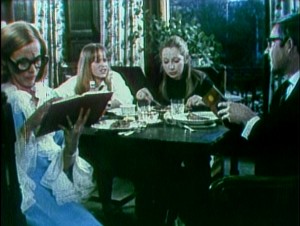 |
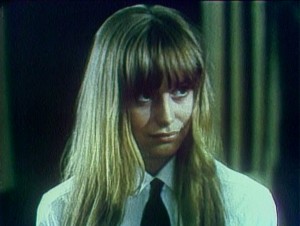 |
Bronson is a writer of trashy soft porn, and it’s his book Twinky’s been caught with. The family continue to debate at home – Blackman ‘can’t see what all the fuss is about’, Trev Howard avers ‘larger, perfectly innocent words begin with f’. When the truth of the affair is gradually revealed (and by gradually we mean suddenly, in a no doubt intentionally virtuoso jump cut from Twinky giggling to Blackman in tears), solicitors are called. Oh good, the family’s solicitor is Lionel Jeffries. Mr Port-Out-Starboard-Home, on the phone, gleefully gossips about the confidential case to a client in the office with him, Eric Chitty. (‘It’s statutory rape!’) Word of Bronson’s nationality comes over the wire. ‘He’s American? I’ll have to have a peep in the immigration act!’ Twinks explains to a sluggish Bronno that ‘English laws are very stiff’, particularly if they come up before a friend of her father’s, Judge Roxbrough, played in a whimsical flash cutaway by Robert Morley. (‘Unfortunately even flogging has been removed for this offence…’) Or, he might find himself up before mummy’s friend, the more lenient Justice Millingdon-Draper. (Jack Hawkins, who suspends his driving licence in a similar gag cut).
There follows a ‘family discussion’ (which Craig runs like a United Nations resolution meeting, complete with arcane voting system) which goes against Twinky’s favour, and sanctions are duly invoked. (‘Oh daddy, please can I have my transistor radio back?’) Two coppers (among them Leslie Schofield) descend on Chuck’s all-white, easy-like-Sunday-morning loft space asking questions about a dodgy Visa. Twinko stupidly tries to impress the plods, and some vintage screwball dialogue ensues. ‘He’s a writer! His book’s so good it’s even been banned in England!’ ‘She’s put you in it now, sir!’ ‘Yup!’ ‘Oh gosh, have I?’ ‘Yup!’ Er, that’s it. Oh, there’s a great line afterwards, where Twinky comforts herself about Chuck’s impending forced departure with a Curly-Wurly: ‘I don’t want my last memories of you smeared with chocolate!’ Then there are the ‘telling’ scenes when La George reveals her inner child (even fluffier than the outer one: e Oh Scott, I just remembered, our school’s got a hockey match on Saturday, can we go?’) and, in the film’s most gruesome sequence, Bronky grades her on sex. (‘Straight A’s!’ Groo…)
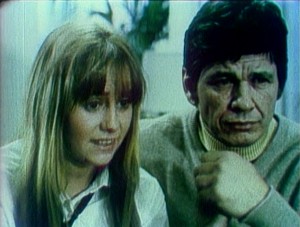 |
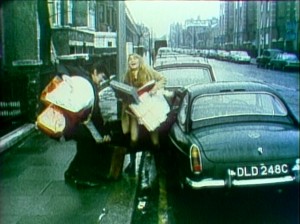 |
To leaven this bilious tendency, Jim Dale sweeps back onto the soundtrack with a lilting composition, backed by Timotei flutes, called The Lonely Year. (‘She is the dawn, and like the dawn she brings the sunny day to the lonely year…’) He sings this in a strangely put-on posh crooner’s voice, for reasons best known to himself, while Bronny and Twinko snog on a traffic island. As if the script couldn’t get any more clichéd, they decide to elope to Gretna Green. ‘Oh Scotty, you’ll be my mummy and daddy, sweetheart and teacher all rolled into one! You’ll be my super new grandfather!’ They’re married by Eric Barker, who may just be putting on his Scottish accent (‘That’ll be five poonds! A two shines and saxpence fer tha starne!’) Time for a balloons-on-car ‘just married’ montage, and another Dale composition, Go Where the Sky Goes. (‘Go where the sky goes/Tomorrow’s catching up with you, so don’t let go today/Go where wind blows/Just stop at Hertz and rent a breeze and you’ll be on the way/Like a coloured balloon…’)
The marriage becomes notorious (no need to explain why!) and the honeymooning pair check their press cuttings with glee. Bronson muses he’ll become ‘the butt of every TV comic in England’ and sure enough, we flash cut to Norman Vaughan and Jimmy Tarbuck in full-on stand-up mode, alternating lines on the same gag. (Norm: ‘When they booked into their honeymoon hotel they didn’t have the birthday suite…’ Tarby: ‘…they had the romper room!’)
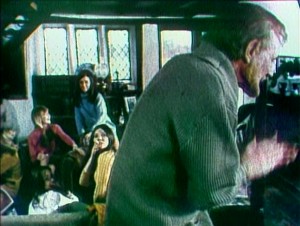 |
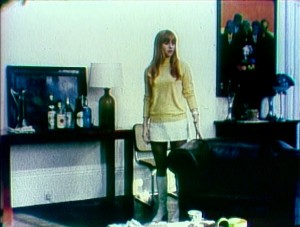 |
Still, George has become the toast of the school changing rooms, where the film briefly threatens to turn into something very different indeed, but fortunately doesn’t. Or maybe it does, as Trevor Howard is suddenly among the girls for some reason, in the requisite split level pad. He’s a fan of the book Bronno’s based on his Georgian affair (‘I enjoyed the chapter where they both had a bath in olive oil,’ he vouchsafes). Meanwhile, Craig lays down the law while Blackman acts out her panto ‘frustrated housewife’ fag-packet character in the background. ‘There are three things I don’t like about you from the start – you’re ugly, you’re middle aged, you’re filthy and you’re American!’ Bronco, without missing a beat: ‘That’s four!’ No punchline knowingly untelegraphed, it would seem – Norman Thaddeus Vane is the spiritual Godfather of Chucklevision.
So it’s off to America with the pair of them, and an awkward meeting which Charlie’s all-American family, headed by the great (but very old-looking here) Paul ‘Colonel Hall’ Ford in a flat cap, keen to know about his new wife (‘ A British girl? Some of them are very lovely!’) The inevitable reveal, given an unnecessary two minutes of build up, is just the meat-and-potatoes ‘slack-jawed group shot’ textbook gag you’d expect. ‘He’s a nymphetishist!’ But Ford’s nervously diplomatic: ‘Son, she’s as pretty as an 18 year old!’ Things turn to shit rather quickly in New York. George partakes in the wimpiest Vietnam-era student demo you ever saw. Bronson tries to get her out (her arrest not being what they want at this juncture) and ends up punching out a cop to Batman comedy musical squeaks. She comforts him in the police cell: ‘Don’t worry! You’ll be home by six!’ Cut to judge: ‘Thirty days! Bang! (Of gavel!)’ Who said great comedy was something you had to strive for?
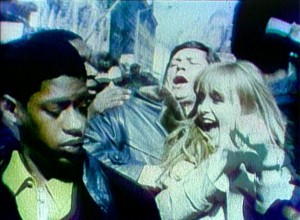 |
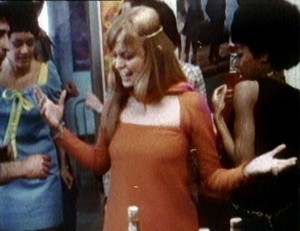 |
With Bron in the slammer, Twinky does up their plush new flat, in the inescapable style of the time – a sped-up comedy collapsing DIY montage, with George putting up wobbly shelves to the sound of a Nickelodeon piano. It must be said that, though the funnies in this script are funny only because we’ve called them funnies to differentiate between that which might just possibly be intended to be funny and that which clearly wasn’t intended to be funny, even though both funnies and non-funnies are uniformly unfunny – in spite of that, the script never passes up an opportunity for a funny. When Bronco’s pal Hal visits him in the prison booth, there’s a faltering, laboured gag where Charlie’s too far from the microphone. It’s funny because it’s true! When he gets out, he goes to the flat, but she’s organised a swinging teenage party, and pretends not to know him on the intercom. Bronson is summarily discharged from the premises by the doorman, aka Jerry Seinfeld’s dad.
Relations are strained; Bronco’s reduced to penning adverts and the writing is officially on the Jefferson Airplane poster-covered wall. There’s a long chat between the two which briefly threatens to move into interesting territory but falls off on Neighbours-level attempts at sour naturalism. ‘Last night that cat had an accident on one of my commercials!’ ‘Permission to speak… have we really had it?’ ‘Wash the back of your neck!’ The end in sight, George breaks down into Gainsborough Pictures-style floods of over-enunciated ‘a-boo-hoo-hoo’ tears. (‘It’ll be funny being a washed out divorcee at sixteen!’) She goes briefly missing and he fears the worst. Amidst the turmoil, the cat goes without grub.
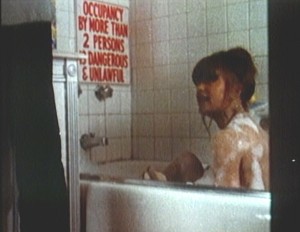 |
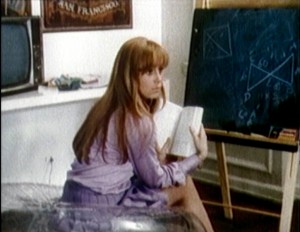 |
Finally, she just, er, buggers off, with another exchange of Thaddeus Vane’s patent full strength ‘just like real life’ epithets. (‘I love you quite rather a lot – you’re not a bad old egg.’) Then she’s away on her stowaway shopping bike, to resume her grainily posh English childhood untroubled by thoughts of Bronson’s looming, simian, ‘Casey Kasem dipped head first in iron filings’ face. And who better to send her gliding on her merry way than Jim Dale? ‘Pretty young girl with a two-wheel bike/All grown up and it just don’t seem right/Gone and broke your heart too soon/You’ll get over it/Just one summer and a month or two/You’ll start laughing like the way you used to/You fell in love too soon/Pretty crazy, dizzy as a daisy/That’s the game you play/Now it’s time to play the grown up way…’
Perhaps it goes without saying, but this was the one out of all these films we only watched all the way through in order to write this middle bit (we’ll take the heartfelt expressions of gratitude at this selfless act as read, thanks). It’s a chore to stay interested in this pair of caricatured no-marks and their tiresome fling, which they seem to be having purely because without it this would be a very dull film indeed. Even with it, you’re out cold in minutes. You know the way The Knack has a, er, knack for mixing slapstick tomfoolery with slightly unsettling sexual deviancy, setting up what Geoffrey Grigson, if you pointed a gun at him, might call a fruitful tension between the two? Well, everything that film does, this film tries to do twice as controversially, misses its footing in the process, and falls backwards into a trestle table plied high with raspberry pavlova. The gritty social realism elements don’t produce an exciting tension with the freewheeling comedy elements, they just sort of silently sit there side by side like two completely dissimilar strangers doomed to an afternoon of stilted boredom thanks to a thoughtless wedding reception seating plan.
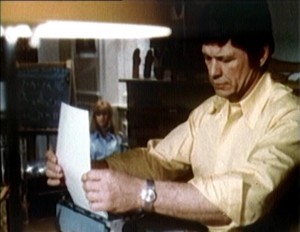 |
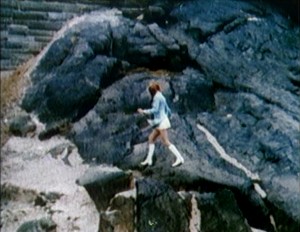 |
Nothing happens at tremendous speed. The character actor cameos just turn up, turn round and piss off the stage, with no fun to be had like there is with, say, Bunny Lake. The comedy’s so broad and corny a soundtrack of gleefully groaning Play Away audience members wouldn’t go amiss. The result is fart. That the characters are boringly black and white is bad enough, but since the cardboard uptight father is just as nothing-doing as grandad’s by-the-numbers colonial eccentricity, it all merges into a grey splodge (which is what all available prints of this film will look like until it’s picked up on DVD). Likewise, the ‘controv’ storyline just sits about, taking its own controversy as excuse enough never to actually go anywhere or do anything. It combines the worst, smug excesses of the taboo-breaking attention seeker with the slapdash fag-packetry of half-arsed sitcom sloppage. The result is a strangely neutral film, that starts, goes on a bit, and then just sort of ends, leaving nonplussed expressions on every exposed surface. Still, as the ever-optimistic Paul Ford might mollifyingly say, Jim’s good value, isn’t he?




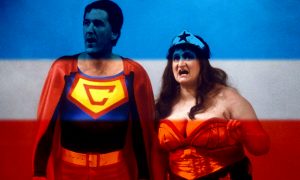

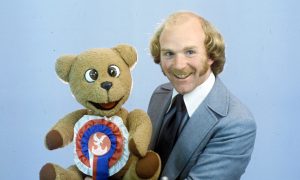















Glenn A
July 6, 2009 at 10:01 pm
A little seen film now, same as Melody which paired up Jack Wilde and Mark Lester again for some japes that involve blowing up the headmaster’s car during a school riot( the headmaster is exposed as a flogger who drives a jeep), running amok in Soho and examining the class differences between the near underclass background of Wilde and the upper middle class Lester. I don’t think this film, like Twinky, has been shown for decades but is worthy of a repeat.
Mr Grimsdale
July 7, 2009 at 10:06 am
For a couple of years in the early 70s, there was no-one on the planet who I worshipped as much as Susan George.